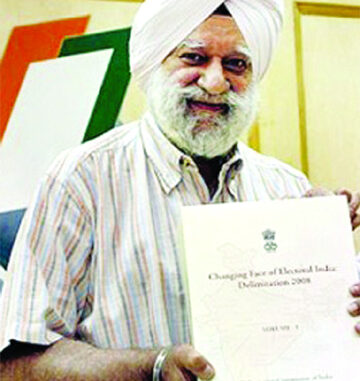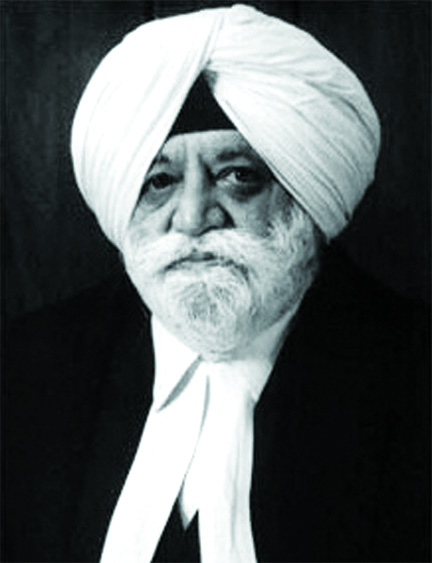

Justice Harjit Singh Bedi
Tributes poured in for two stalwarts of the Indian judiciary – Justice Kuldip Singh and Justice Harjit Singh Bedi – who passed away in November this year.
Justice Harjit Singh Bedi died on November 21, followed closely by Justice Kuldip Singh on November 25.
“Their passing has created an irreplaceable void, but their contributions and values will continue to inspire us as we move forward,” a resolution, signed by former judges, including Justice S S Sodhi, Justice M S Liberhan, Justice Mehtab Singh Gill, Justice S S Saron, Justice Ranjit Singh Randhawa, Justice Nawab Singh, Justice Rajiv Narain Raina, Justice Nirmaljit Kaur, Justice Jaishree Thakur, and Justice Sabina, expressed deep sorrow at the untimely passing of both luminaries within days of each other, stated.
Justice Kuldip Singh
(1 Jan 1932 – 25 Nov, 2024)
Justice Kuldip Singh was a renowned jurist and former judge of the Supreme Court of India, recognized for his unwavering commitment to environmental protection and human rights. His tenure in the judiciary left a significant impact on Indian jurisprudence, particularly in public interest litigation (PIL) and environmental law. Below is a detailed profile of his illustrious career and contributions.
Early Life and Education
Justice Kuldip Singh was born on January 1, 1932, in Punjab, India. He pursued his education with distinction, earning his degree in law from Panjab University, Chandigarh. After completing his studies, he embarked on a legal career that would see him rise to prominence in the Indian legal system.
Legal Career
Justice Singh began practicing law in the early 1950s, specializing in constitutional, civil, and corporate law. His expertise and dedication earned him widespread respect within the legal fraternity. Over the years, he was involved in several landmark cases, which helped cement his reputation as an advocate of justice and fairness.
He was designated as a Senior Advocate by the Punjab and Haryana High Court, a recognition of his legal acumen and skill. Subsequently, he served as the Advocate General for the state of Punjab, a role in which he provided legal counsel to the state government on critical legal and constitutional matters.
Appointment to the Supreme Court
Justice Kuldip Singh was appointed as a judge of the Supreme Court of India on December 14, 1988. During his tenure, which lasted until December 21, 1996, he delivered several landmark judgments that have had a lasting impact on Indian law and society.
Landmark Contributions
Justice Singh’s judicial philosophy was marked by his emphasis on social justice and environmental sustainability. His notable contributions include:
Environmental Jurisprudence
Justice Singh is often referred to as the “Green Judge” for his landmark rulings in environmental cases. Under his watch, the Supreme Court actively employed the principle of sustainable development to balance environmental protection with economic progress.
In cases like Vellore Citizens Welfare Forum v. Union of India (1996), he emphasized the importance of the “precautionary principle” and the “polluter pays principle” in managing environmental challenges.
He also played a pivotal role in directing measures to control industrial pollution, protect forest cover, and preserve biodiversity.
Public Interest Litigation (PIL)
Justice Singh was a strong proponent of PILs as a tool to address societal inequities. Through his judgments, he expanded the scope of PILs to include issues like environmental degradation, human rights violations, and corruption. His rulings empowered ordinary citizens to approach the judiciary for redressal of public grievances.
Human Rights Advocacy
Justice Singh demonstrated a profound commitment to upholding human rights. He authored judgments that safeguarded the rights of marginalized communities, upheld personal liberties, and strengthened the implementation of constitutional guarantees.
Electoral Reforms
Justice Singh was instrumental in advocating for transparency and fairness in the electoral process. His judgments stressed the need for free and fair elections, ensuring the sanctity of democratic institutions.
Legacy and Recognition
Justice Kuldip Singh’s judicial career left a deep imprint on the Indian legal system. His proactive approach to environmental and social justice earned him widespread recognition, both domestically and internationally. He is celebrated for bringing environmental issues into the mainstream of judicial discourse in India.
Post-retirement, he continued to contribute to legal and social causes. He chaired various committees and commissions, including one on electoral reforms, where he made significant recommendations to enhance transparency and accountability in India’s democratic processes.
Justice Kuldip Singh is known for his humility and dedication to public service. Despite his high-profile career, he remained grounded, focusing on issues that affect the common man.
Justice Kuldip Singh’s legacy as a jurist lies in his progressive judgments and his commitment to the ideals of justice, equality, and environmental sustainability. His contributions continue to inspire legal practitioners, environmentalists, and social activists in India and beyond.
Justice Harjit Singh Bedi
(Sept 5, 1946 – Nove 21, 2024)
Justice Harjit Singh Bedi (September 5, 1946 – November 21, 2024) was a distinguished Indian jurist who served as a judge of the Supreme Court of India. His legal career was marked by significant contributions to the Indian judiciary, characterized by fairness, integrity, and a deep commitment to justice.
Early Life and Education
Born in Sahiwal (formerly Montgomery), now in Pakistan, Justice Bedi hailed from a family of agriculturists. Notably, he was a direct descendant of Guru Nanak, the founder of Sikhism, being 17th in the line. Following the partition of India, his family settled in Fazilka, a township near the India-Pakistan border. His father, Tikka Jagjit Singh Bedi, served as a judge on the Punjab and Haryana High Court until his retirement in 1969.
Justice Bedi completed his schooling at Bishop Cotton School in Shimla, obtaining his Senior Cambridge certificate in 1962. He pursued higher education in law, which laid the foundation for his illustrious legal career.
Legal Career
Enrolled as an advocate with the Bar Council of Punjab & Haryana on July 17, 1972, Justice Bedi practiced in civil, criminal, and writ matters. Between 1974 and 1983, he also served as a part-time lecturer in the Department of Laws at Panjab University, Chandigarh, demonstrating his dedication to legal education.
His career in public service began with his appointment as Deputy Advocate General for Punjab in 1983. He was designated as a Senior Advocate in 1987 and subsequently served as Additional Advocate General until 1989. In 1990, he was appointed Advocate General of Punjab, a position he held for about a year.
Judicial Appointments
Justice Bedi’s judicial career commenced with his appointment as an Additional Judge of the Punjab and Haryana High Court on March 15, 1991. He became a permanent judge on July 8, 1992. His judicial acumen led to his elevation as the Chief Justice of the Bombay High Court on October 3, 2006. Shortly thereafter, on January 12, 2007, he was appointed as a judge of the Supreme Court of India, where he served until his retirement in 2011.
Notable Contributions
Beyond his tenure on the bench, Justice Bedi was entrusted with significant responsibilities post-retirement. In 2012, the Supreme Court appointed him as the Chairman of a Special Task Force monitoring committee to oversee investigations into custodial deaths in Gujarat. His report, submitted in 2019, identified misconduct in several cases, underscoring his unwavering commitment to human rights and accountability.
Additionally, he was tasked by the Jammu and Kashmir Government to probe the mysterious death of National Conference activist Mohammad Yousuf Shah, approaching the assignment with the tenacity and care that defined his career.
Justice Bedi’s personal life was deeply rooted in his family’s legal tradition. His son, Justice Jasjit Singh Bedi, continues the legacy, serving as a judge of the Punjab and Haryana High Court.
Colleagues and friends remember Justice Bedi as a gentleman judge, whose judgments were known for their clarity and compassion. His demeanor combined gentle firmness with a profound sense of humanity, leaving an indelible mark on Indian jurisprudence.





Be the first to comment